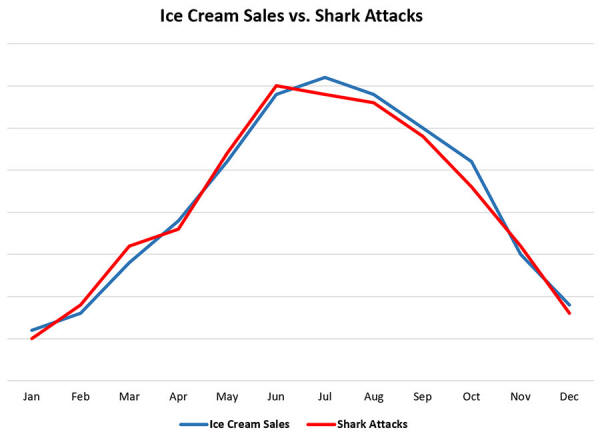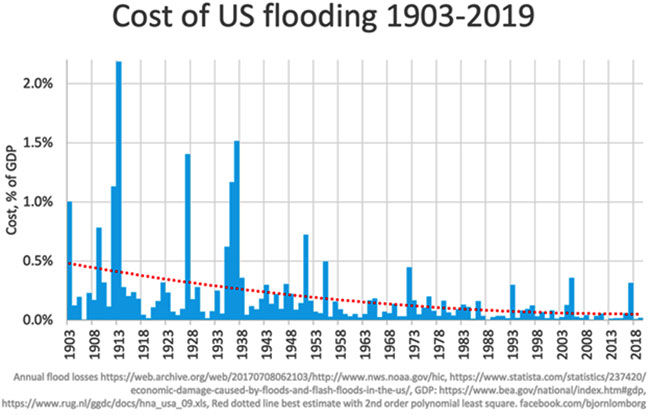|
A recent article published by The Corporation for Public Broadcasting (PBS) claims that,
Various lines of evidence and hard data falsify this claim.
The article, originally by Isabella O'Malley, of the Associated Press (AP) was carried on the PBS Newshour website with the title "Scientists confirm global floods and droughts worsened by climate change".
The article leads with this alarming claim:
For good measure, O'Malley adds this unsupportable claim:
As any professional scientist will tell you, correlation is not causation.
Wikipedia says,
For example, data in this graph in Figure 1 below correlates nearly perfectly, but anyone can tell you that the two data items plotted, Ice Cream Sales and Shark Attacks, have no cause-and-effect relationship.
Figure 1. A highly correlated graph with no relationship between the two datasets. Source: Statology.org
There are other problems with the article, most notably the time period of data involved - 20 years - which by definition does not meet the 30-year period required to determine a climate trend.
Worse than that, the article reports,
In other words, in addition to the lack of 30-years of data, this study used a "novel algorithm" that has not been applied to other areas or the same areas in the past for a proper comparison of past and present climate trends and any changes over time.
Also, this data is from a satellite designed to measure variations in Earth's gravity, not climate change...
Therefore, the data produced isn't a direct measurement, but a proxy for what has happened with droughts and floods assumptions about how gravity changes.
These three glaring inconsistencies with regular climate science procedures fail to instill trust in the methods used in, or the conclusions come to, in this particular study.
Real-world data, actually measured on Earth over multiple decades, contradicts the claims made in the study and the AP/PBS story reporting on it.
For example, data on drought in the United States, presented in Climate at a Glance - Drought, show no increasing drought trend whatsoever since January 1895.
The U.N. Intergovernmental Panel on Climate Change (IPCC) reports,
Likewise, when it comes to flooding, The IPCC reports it has,
The U.N. IPCC admits having "low confidence" in even the "sign" of any changes, in other words,
The latter point highlights another grievous error made in the study hyped by PBS - the researchers involved conflated precipitation and flooding.
The IPCC report indicates climate change is not a factor in flooding.
As Roger Pielke, Jr., said in his summary and analysis of the report,
Also of note, what flooding has occurred, has been impact-minimized as costs of flooding have decreased over the last century, as seen in Figure 2.
Figure 2. Cost of U.S. Flood Events since 1903 through 2018. Dotted red line indicates the trend.
While the rest of the world may not have effective mitigation measures for flooding due to lack of resources, the bottom line is that,
Unfortunately, the AP writer O'Malley completely ignores this in favor of the findings of a single study that contains, at a minimum, three major flaws in the way it gathered, analyzed, and reported its results.
This flawed reporting seems to be a sad trend. Just last year, an AP article linked climate change to severe flooding in South Africa.
The widely carried AP story, "Climate change a major factor in fatal South Africa floods," was typical of the media's coverage of flawed and unverified research.
Just as with the recent PBS story, a modicum of basic research proved the earlier claims false.
In, Wrong, CNN, AP, NYT, etc., Climate Change Did Not Cause South Africa's Tragic Floods, my colleague Sterling Burnett showed there was no evidence linking South African flooding to climate change.
Why do mainstream media outlets promote alarming, novel results from unverified studies, while ignoring contrary existing evidence?
The AP, received a grant of $8 million over three years, to hire twenty new "climate journalists," who, like O'Malley, seemingly ignore the truth when telling the truth fails to further their funded mission.
Coincidence...?
|




